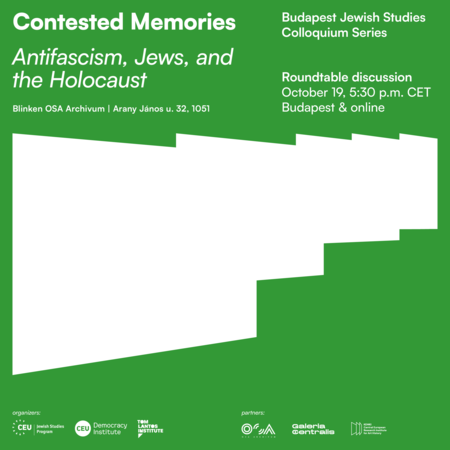Contested Memories: Antifascism, Jews and the Holocaust
a roundtable discussion
by
The Budapest Jewish Studies Colloquium
in cooperation with
the CEU-Democracy Institute, the CEU Jewish Studies Program, and the Tom Lantos Institute
Speakers: Tímea Jablonczay, Ágnes Katalin Kelemen, Dániel Véri, Máté Zombory.
Moderated by Eszter Susán.
Time: October 19, 5:30 p.m. – 7:00 p.m., 2023
On-site: Blinken OSA Archivum, Arany János utca 32, Budapest, research room
Online: Meeting ID: 988 3649 1629
Passcode: 896372
Reception to follow.
Registration required by October 18: https://forms.office.com/e/efJ2YKBtsR
Abstract
This roundtable discussion explores the various ways the Holocaust was represented in Cold War Central Europe, considering major examples of official memory politics, exhibition histories, fine arts, and literature in the 1960s. It considers the agency of state actors, the Jewish community, as well as individuals, especially artists and writers, paying special attention to the eminent role played by the antifascist historical narrative.
OSA Archivum’s current exhibition offers a starting point for the discussion. Titled “Commissioned Memory. Hungarian Exhibitions in Auschwitz, 1960/1965,” it introduces a monumental fine arts collection commissioned for the 1965 Hungarian exhibition in Auschwitz, as well as an exceptional work from 1960 (‘Vampire Hitler,’ based on Simon Wiesenthal’s 1946 drawing), created for the same venue.
Speakers
Ágnes Katalin Kelemen
earned her PhD in Comparative History from Central European University in 2019, with an emphasis in the fields of Nationalism-, Religious-, and Jewish Studies. Following a postdoctoral fellowship at the Masaryk Institute and Archives of the Czech Academy of Sciences in Prague, she is currently a research assistant at the CEU-Democracy Institute (Budapest). Her work focuses on displaced students and scholars in Europe in the twentieth and twenty-first centuries.
Eszter Susán
graduated from ELTE University with a degree in Aesthetics and German Literature and Linguistics. During this time she spent three years in Berlin, where she studied Holocaust representation in art and literature, as well as approaches to Holocaust education. From 2013, Eszter studied and worked as a teaching assistant in the “Education and Jewish Studies” doctoral program of New York University (NYU). In her PhD dissertation, she explored the theme of dissent and resistance during the Kadar era (1967–88) in Hungary from a Jewish perspective.
Next to her academic activities Eszter actively participated in the rethinking and revitalization of Hungarian Jewish culture since the early 2000s. She was a founding member of the MAROM Jewish youth and cultural association, where she led several experiential learning projects, among them an interactive blended learning tool with a focus on Budapest’s Jewish social history. Since July 2022 Eszter has been Manager for the Jewish Life and Countering Antisemitism Program at the Tom Lantos Institute.
Tímea Jablonczay
is an associate professor in the Department of Media and Culture at Milton Friedman University. In 2022, she was a research fellow at the Institute of Advanced Studies in Kőszeg (iASK). She trained as a literary scholar at the University of Pécs, Hungary, and the University of Jyväskylä, Finland where she obtained her doctorate in Hungarian Women Writers in the Interwar Period in 2009. She published on narratology, elaborated local identity research [Identity and image research in Dabas (2013)], several articles about female literature, edited volume Helikon 2022/3 Transcultural Memory Studies, Helikon 2015/2 Transnational Perspectives in Literary Studies.
Her current research focuses on Hungarian female Holocaust testimonies and transcultural memory processes. She has been undertaking research on the cultural heterogeneity and literary works of Erzsi Szenes (1902–1981) for many years, investigating her literary career in Central-Europe, and her Holocaust and diasporic memories in Israel after the Holocaust. She is working on three major works: a monograph on Erzsi Szenes, the memory of the Holocaust in Hungary during the 1960s, and Hungarian female Holocaust memory (1945–89).
Daniel Véri
is an art and cultural historian, researcher at the Museum of Fine Arts – Central European Research Institute for Art History (KEMKI) in Budapest. CEU Jewish Studies postdoctoral fellow at the Democracy Institute (2021–22), member of the ‘Confrontations: Sessions in East European Art History’ research group (UCL, 2019–22). He studied at ELTE (history of art: MA, 2009; PhD, 2016), and at CEU (history, 2010).
His research interests include Central European art from the 1945–89 period, especially the artistic reception of Jewish identity and the Holocaust, as well as cultural diplomacy and the cultural history of blood libels. Author of ”Leading the Dead” – The World of János Major (2013), co-author of The Great Book Theft. French Book Exhibition Behind the Iron Curtain (2020). Curator and co-curator of numerous research-based exhibitions.
Máté Zombory
is an associate professor at ELTE Faculty of Social Sciences and senior research fellow at the Centre for Social Sciences in Budapest. He obtained his PhD in 2010, his dissertation, entitled Maps of Remembrance, was published in 2012. His field of interest is the historical sociology of transnational and cultural memory. His current research projects include the Cold War history of Holocaust documentation with particular attention to the work of Hungarian journalist and author Jenő Lévai, supported by the Fondation pour la mémoire de la Shoah, Paris, and the history and memory of international antifascism.
His recent publications include Traumatársadalom. Az emlékezetpolitika történeti-szociológiai kritikája [Trauma Society. A Historical-Sociological Critique of the Politics of Memory] (2019) and a number of articles in journals such as Memory Studies, Journal of cold War Studies, Revue d’études comparatives Est-Ouest, Múltunk, Korall, Szociológiai Szemle.

